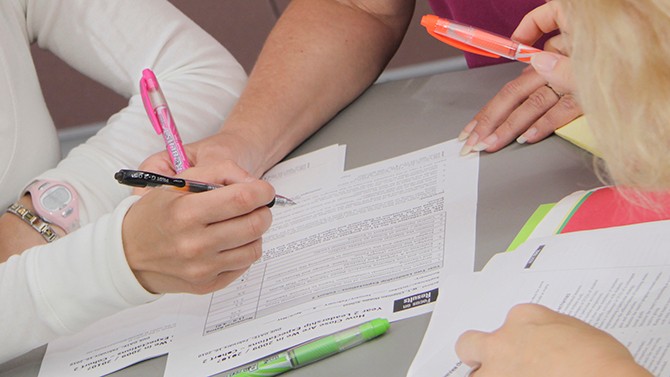School of Education
MacArthur and research team develop college writing intervention

“I didn’t think this class was going to help me do anything else in college, but I was wrong. I used the same writing steps to complete an essay for my philosophy class, and it became easy to write.” This is the experience shared by a community college student in a journal entry.
University of Delaware researchers Charles (Skip) MacArthur, professor of special education and literacy, Melissa Ianetta, associate professor of English and director of the UD Writing Center, and Zoi Philippakos, a UD alumna, have created an instructional intervention that provides community college students the tools to significantly improve their writing skills. It is called Supporting Strategic Writers (SSW).
How does SSW work?
The SSW program allows students to take ownership of their learning and prepares them for college work. It uses a systematic approach to writing with the following process of instruction:
• The students learn strategies to plan, draft and revise compositions. This knowledge of the basic writing process is integrated with knowledge of genres.
• The teacher uses think-aloud modeling, allowing beginners to see how independent writers use strategies to cope with challenges when they arise.
• Self-regulation strategies – setting goals, managing tasks, monitoring progress, and reflection – are integrated with writing instruction. In this way, the SSW curriculum also provides strategies for academic success.
For each genre of writing, students learn the common organizational structures. They make use of graphic organizers to plan their content, and rubrics to evaluate their work. Both graphic organizers and rubrics reflect these organizational elements.
For example, in learning argumentative writing, students discuss the purposes and analyze good and weak examples using evaluation criteria. To learn to appreciate the importance of counterarguments, they engage in debates. The graphic organizer then includes space for reasons and evidence on both sides and possible rebuttals.
For each unit, strong and weak examples are evaluated before the think-aloud modeling by the teacher. This is followed by the teacher-student collaborative writing and finally the student-guided independent writing. The students also engage in peer review. In this way, students get repeated practice of the writing strategies across multiple genres.
The program has multiple instruction units with different genres. College programs can choose the units that match their instructional goals.
Development of SSW
Development and evaluation of this curriculum was part of a research project funded by the Institute of Educational Sciences, U.S. Department of Education. The project devoted two years to design research with three cycles of iterative curriculum development, implementation, and revision. The results showed large gains in the quality of student writing.
Evaluation of SSW
The researchers have now received a second grant, called Effects of an Innovative Developmental Writing Program on Writing and Reading Outcome to test and expand their work. This five-year, $3 million grant will encompass 60 faculty members and approximately 1,200 students in developmental writing courses in seven community colleges.
To determine the effect of the intervention, evaluations will be conducted in two distinct stages, to see how the curriculum affects their success in later courses or degree completion. At beginning and end of each semester of instruction, students will complete the following assessments:
• Persuasive essays scored for overall quality, length, and grammar;
• A motivation questionnaire tapping goal orientation, beliefs, self-efficacy, and affect; and
• Standardized tests of writing and reading.
“Writing skills are increasingly being considered by the potential employers as vital during the hiring process,” said MacArthur. “Writing acumen is one of the keys to academic and professional success. The SSW intervention program is a systematic approach that cultivates independent writers. It helps the students to develop strategies to use their writing skills across different writing situations.”
For more details on this research, visit the College of Education and Human Development’s research website.
Article by Harpreet Kaur



